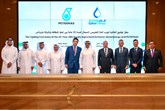Titan completes first bunkering to MOL under new term contract
Published by Jessica Casey,
Editor
LNG Industry,
Titan Clean Fuels and Mitsui O.S.K. Lines (MOL) have completed the first LNG and bio-LNG bunkering operation of a new multi-delivery contract for MOL’s vehicle carrier fleet.
On 16 March, Titan’s Alice Cosulich LNG bunkering vessel delivered 500 t of bio-LNG and 400 t of conventional LNG to the Celeste Ace vehicle carrier. The simultaneous operation (SIMOPS) bunkering took place in the Port of Zeebrugge’s International Car Operators (ICO) terminal.
Titan’s delivery of ISCC-EU-certified mass-balanced bio-LNG marks the first of a series of bio-LNG deliveries to the Japanese shipping company. The bio-LNG was produced using waste and residue, which reduces greenhouse gas (GHG) emissions by up to 100% compared to marine diesel on a well-to-wake basis. LNG, bio-LNG, and renewable hydrogen-derived e-methane can be blended at any ratio and ‘dropped into’ existing LNG bunkering infrastructure with little to no modification.
Nicolas Ganas, Senior Trader and Business Development Manager at Titan stated: “We applaud MOL’s commitment to LNG and bio-LNG as marine fuels, reinforcing the shift towards cleaner shipping. This collaboration strengthens our partnership in the region, and we look forward to reliably supplying their vessels with lower-carbon fuel solutions.”
Caspar Gooren, Commercial Director of Renewable Fuels at Titan, commented: “This bunkering highlights the growing role of bio-LNG in decarbonising international shipping today. With bio-LNG availability expanding, its deep decarbonisation potential, and increasing commercial viability, the LNG pathway offers practical solutions for shipowners and operators. Moreover, with a global maritime leader like MOL putting its commercial weight behind bio-LNG, this is an exciting time for the clean fuels transition.”
Yoshikazu Urushitani, Marine Fuel GX Division General Manager at MOL said: “We are exploring the use of ammonia and hydrogen fuels as part of our strategy to adopt clean alternative fuels, while moving to expand the use of LNG-fuelled vessels and more quickly achieve a low-carbon society. We will also be early adopters of bio-LNG and synthetic LNG. Partnering with Titan, we will start using bio-LNG to lead the shipping industry in the transition to clean alternative fuels. We remain committed to adopting clean fuels to reach net zero GHG emissions by 2050.”
The number of vessels in use and on order that can use LNG, bio-LNG, and in the future e-methane, showcases how significant a role the LNG pathway will play in shipping’s decarbonisation. MOL currently operates five LNG-fuelled vehicle carriers and will have six more delivered by the middle of 2025. In total, there are 62 vehicle carriers that can operate on LNG today and another 146 of these LNG-fuelled vessels are on order. Some 90% of vehicle carrier orders feature LNG dual-fuel propulsion.
Read the article online at: https://www.lngindustry.com/small-scale-lng/18032025/titan-completes-first-bunkering-to-mol-under-new-term-contract/
You might also like
PETRONAS signs 20-year LNG supply agreement with QatarEnergy
PETRONAS has signed a 20-year LNG sale and purchase agreement with QatarEnergy.


